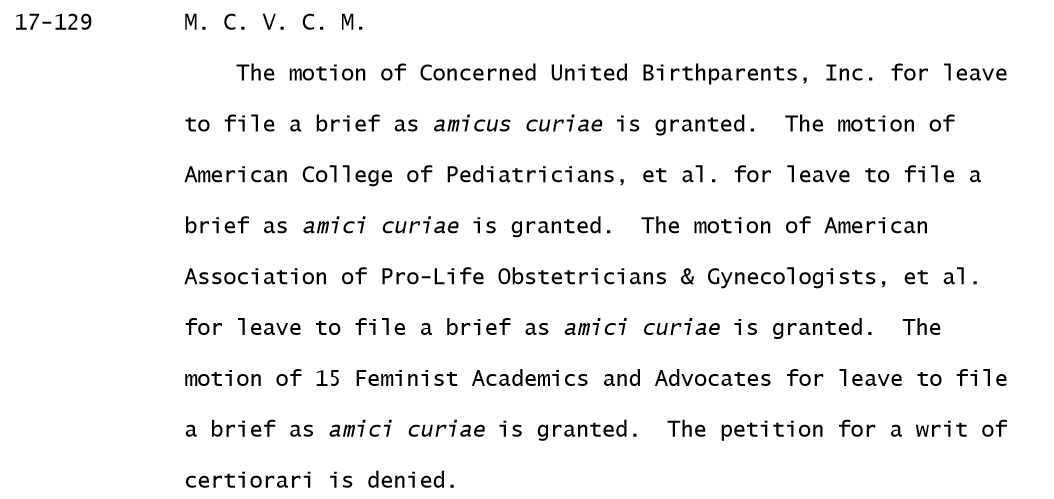
Monday the Supreme Court announced it will not hear the case of M.C. v. C.M., handing a huge and likely impenetrable victory to the burgeoning surrogacy industry. Here’s why.

But first, the background of the case. “M.C.” is Melissa Cook, a 47-year-old surrogate who made national news last year when she went public with her feud with C.M., the biological father of the children she bore, whose name is Chester Moore Jr. Cook was pregnant with triplets following a round of invitro treatment in which doctors implanted into her womb three embryos created with Moore’s sperm and donor eggs from a 20-year-old woman. After all three embryos survived, Moore demanded Cook abort one of the babies pursuant to the terms of the surrogacy contract.
Cook refused, declaring “I am pro-life and I’m not having an abortion.” And she didn’t. But she also wanted to ensure the “extra” baby didn’t go to Moore and that before Moore obtained custody of any of the babies, the government would ensure he was a fit father. Accordingly, Cook filed suit challenging the constitutionality of California’s surrogacy laws, arguing the statutes violate her and the then-unborn babies’ federal due process and equal protection rights.
Cook sued in both federal and state court, but the federal court dismissed her lawsuit based on the pending state court custody proceedings. Cook fared no better in the state court system, losing both at the trial and intermediate appellate court levels. The California Supreme Court refused to hear Cook’s appeal.
So the Daddy Who Didn’t Want The Babies Got Them
As a result, when Cook went into labor two months early, her parental rights had already been terminated and Moore was legally declared the sole parent of the three tiny babies. The newborn preemies were quickly rushed to NICU, where they remained for three months without mother or father at their sides. The hospital refused Cook’s requests to see the babies or even learn of their condition, and Moore, a postal worker in Georgia, reportedly visited for only a short time.
Concerned over the children’s welfare, Cook continued her legal fight. In July 2017, she filed a petition for review in the U.S. Supreme Court, seeking to challenge the state court decisions on federal constitutional grounds. Specifically, Cook asked the justices to decide six constitutional questions, including whether California’s Gestational Surrogacy Statute violates the equal protection or substantive and procedural due process rights of either surrogates or babies born to surrogates.
The question Cook sought to litigate before the Supreme Court was whether the constitutional guarantees of due process and equal protection trump state surrogacy laws. Currently, there is a patchwork of differing state laws, with California (predictably) offering one of the most liberal surrogacy laws in the nation. Under California law, gestational surrogates—i.e., women carrying an unborn baby created with another woman’s eggs—may have their parental rights terminated prior to birth based on the surrogacy contract’s terms even if the surrogate later seeks to assert parental rights. California law also allows a court to name the child purchaser the legal parent prior to birth and without any consideration of “the best interests of the child.”
A Victory for the Surrogacy Industry, But Not Entirely
The Supreme Court’s refusal to hear the appeal represents a victory for the highly unregulated surrogacy industry. But as Kathleen Sloan, co-author of an amicus curiae (friend of the court) brief filed in support of Cook, argued recently in a must-read piece for Public Discourse, a loss for Cook has even more dire consequences:
“Surrogacy is creating a generation of children severed from biological and genetic identity and a breeder class of marginalized women. Both are being transformed into commodities for sale on the global marketplace. This can only be accepted and condoned by a society untethered from any sense of ethics, human rights, dignity, or moral values. When the primal bond—as ancient as humankind itself—between mother and child is destroyed, what will be left?”
While these words may read as a mere rhetorical plea for Cook’s case, recent developments ground these platitudes in the reality. According to an affidavit signed by Moore’s sister, Melinda Burnett, her brother the triplets’ father, who is deaf and mute and lives with their elderly invalid parents, is unable to care for the three boys. Burnett further claims that the children, who are now 18 months old, live in deplorable conditions in the basement with her 51-year-old brother.
The living conditions of the children and Moore’s capabilities as a parent were not at issue in the case. Rather, the sole question Cook asked the Supreme Court to consider was a legal one: whether surrogate mothers and babies born to them have constitutional rights that trump state surrogacy laws.
But if there were ever a case that screamed of the scandal underlying the surrogacy industry, this would be it. Yet, notwithstanding the appalling facts underlying Cook’s case, the justices refused to hear her appeal. The denial of a petition for review has no precedential value, meaning it does not indicate the Supreme Court’s agreement or disagreement with the lower court’s decision.
Nonetheless, given the Supreme Court’s refusal to enter the fray in this case, which presents the most compelling case for constitutional limitations on state surrogacy laws, the justices seem committed to a hands-off approach in this area of law. Parenting, though, is not a hands-off enterprise—something Moore appears to be learning the hard way. Unfortunately, three innocent children must suffer the lifetime consequences of that lesson as well.









